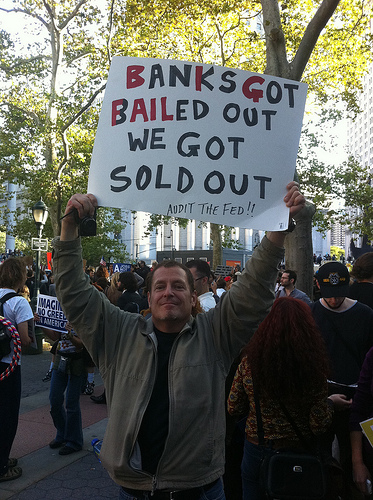“Banks got bailed out/We got sold out.” This was one of the first slogans of Occupy that suggests it has always been a mature movement that has worked out its first sense of loss. Perhaps some its sustaining force comes from that combination of the knowledge of having been betrayed already, even before anything has been attempted. The real depth come from the awareness that we betrayed ourselves.
In a recent essay on betrayal, the psychoanalyst Adam Phillips points out
In psychoanalysis betrayal is called, variously: weaning, the birth of a sibling, the Oedipus complex, and puberty. At each of these developmental stages in the psychoanalytic story, the child suffers what feels like a breach of trust, a loss of entitlement, a diminished specialness.
“We got sold out.” We were betrayed, again, by the person in whom we had placed trust, meaning presumably Obama.
That works to an extent but it’s not quite right. Remember how, the very night he won the election, Obama’s address was something of a disappointment? The best thing about electing Obama seemed to be that it was an end to the Bush-style neo-liberalism. In more optimistic vein, it briefly seemed like a decisive stage in the civil rights movement, a transformation of relations of difference. By 2010 it was clear that none of that was true and that the Republicans, written off two years before, were going to win the mid-term elections. In an interview with Amy Goodman in October 2010, Angela Davis was asked how she viewed Obama:
What really disturbs me is that we have failed…. There are many issues about which we can be critical of Obama, but at the same time, I think we need to be critical of ourselves for not generating the kind of mass pressure to compel the Obama administration to move in a more progressive direction, remembering that the election was, in large part, primarily the result of just such a mass movement that was created by ordinary people all over the country.
Obama didn’t betray us: we betrayed ourselves by assuming that November 4, 2008 marked the end of our participation. Unusually, we got another chance.
In this view, the eight weeks of the encampment at Liberty Plaza were not the rise and fall of Occupy–that had already happened over a long period of time, dating, in Angela Davis’s perspective to the abolition democracy that put an end to formal slavery. You might call it the setting aside of the “hope” that a vertical politics of leaders and the led, whether of left or right, could actually implement “change you can believe in.” Or you could call it the (re)start of a commitment to building within the ruins. There’s a curious rhythm to Occupy: rise and fall, success and setback, stepping up and stepping back that echoes that pattern. It frustrates the desire of some that the movement should simply go away, even as it also prevents the emergence of “leaders.”
Phillips points to a precedent. In 1966, when Bob Dylan was playing in Manchester, a fan infamously called out “Judas.” Dylan replied: ” I don’t believe you. You’re a liar.” He turns to his band and says: “Play it fucking loud.” It being Like A Rolling Stone.
What Phillips doesn’t get, though, is that by calling Dylan “Judas,” the fan figured himself as Christ. It’s a very satisfying subject position, no doubt. In Scorcese’s 2005 documentary No Direction Home, the folkies are still playing the betrayal card: forty years later. That’s what happens when being betrayed becomes a means of identification. All that mourning, all that trauma. Or you can refuse the figuration as either betrayer or betrayed, accept that there’s no going home again, and go electric.

